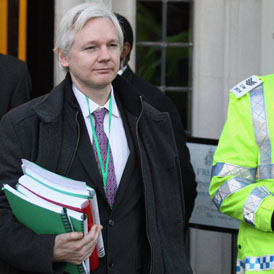The last stand in Julian Assange’s extradition battle
The WikiLeaks founder must wait again to learn his extradition fate, but should Julian Assange “accept defeat gracefully” in his long-running battle to avoid going back to Sweden?

A panel of seven judges has reserved judgment after hearing legal argument from lawyers representing Julian Assange and Swedish prosecutors at a two-day hearing at the Supreme Court in London.
The Swedish authorities want Mr Assange to answer accusations of “raping” one woman and “sexually molesting and coercing” another in Stockholm in August 2010, which he denies.
Earlier this week the WikiLeaks founder asked the court to block his extradition on the grounds that the European arrest warrant issued against him is “invalid and unenforceable”.
A QC for the 40-year-old Australian said the Swedish public prosecutor who signed the warrant could not issue a valid document because she lacked “impartiality and independence”.
His wisest strategy might be to accept defeat gracefully and say that he is ready to return to Sweden right away. Brian Palmer
Brian Palmer, a former lecturer at Harvard, is a social anthropologist at Uppsala University in Sweden, and an expert on Assange’s legal battle. He told Channel 4 News this was “probably” the only card left for Assange’s team to play.
He explained: “If the UK court rules against him, his wisest strategy might be to accept defeat gracefully, acknowledge that his case has received thorough judicial attention, and say that he is ready to return to Sweden right away.
“His critics in Sweden portray him as arrogant, and he would be well advised to work to undo that image now.”
Mr Assange has long claimed his extradition would be “disproportionate” to the crimes he is alleged to have committed.
“The Swedish prosecutor authorised an Interpol Red Notice – the highest urgency alert – for finding and detaining Assange,” Palmer explained.
“Some commentators have contended that this was absurdly disproportionate to the suspicions against Assange, noting that the murderous leader of Libya, Muammar Gaddafi, received a lesser Orange Notice on Interpol.”
More from Channel 4 News: Are the wheels coming off WikiLeaks?
In Sweden the media climate is “mostly highly critical” of Assange, according to Palmer.
He added: “News about Assange is still relatively high on newspapers’ websites and first pages [in Sweden], but the discussion of arrest warrants offers less lurid tabloid material than the earlier stories with their details of sexual interactions.
“The news interest would peak again if Assange landed in Stockholm.”
Mr Assange, whose WikiLeaks website published a mass of leaked diplomatic cables that embarrassed several governments and international businesses, has always insisted the sex was consensual and the allegations against him are “politically motivated”.
-
Latest news
-
Yungblud launches his own affordable music festival5m

-
Why these Americans want to quit their state9m

-
Company behind infected water outbreak are ‘incompetent’ says local MP5m

-
Israeli forces push deeper into Northern and Southern Gaza4m

-
India’s ‘YouTube election’: Influencers enlisted to mobilise youth vote6m

-




